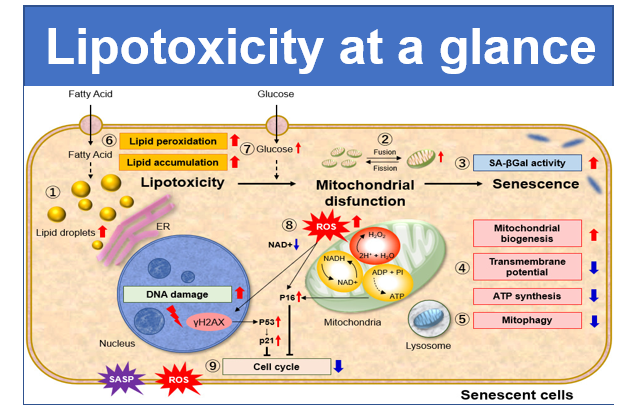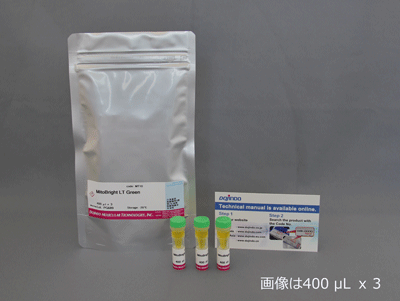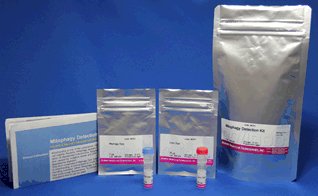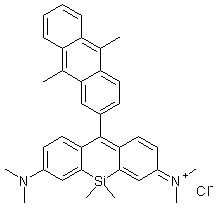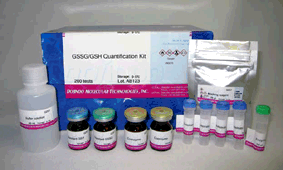MitoPeDPP
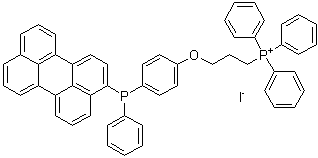
Mitochondrial Lipid Peroxide Detection
- Cell membrane permeable probe
- Mitochondria targeted imaging is possible
- Desirable fluorescent properties (ex. 452nm / em. 470 nm)
-
Product codeM466 MitoPeDPP
-
CAS No.-
-
Chemical name3-[4-(Perylenylphenylphosphino)phenoxy]propyltriphenylphosphonium iodide
-
MWC53H41IOP2=882.74
| Unit size | Price | Item Code |
|---|---|---|
| 5 μg x 3 | $254.00 | M466-10 |
Product Description
MitoPeDPP is a cell-membrane-permeable probe, Perylene-based dye. It specifically localizes in mitochondria due to the triphenylphosphonium moiety introduced. MitoPeDPP is used to monitor lipid peroxidation in ferroptosis research.
As the excitation and emission wavelength of MitoPeDPP are 452 nm and 470 nm, respectively, the probe can be applied for lipophilic peroxide imaging in living cells.
*This probe has been developed by Dr. Shioji et al. at Fukuoka University, Department of Chemistry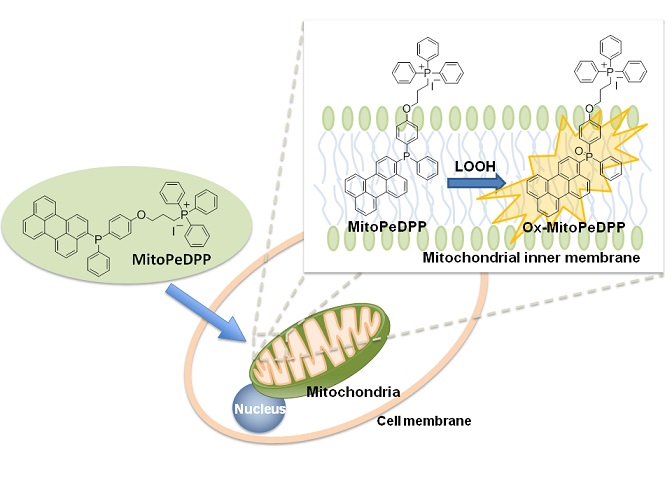
Manual
Technical info

A: MitoPeDPP stained Mitochondria with t-BHP treatment
B: MitoRed stained Mitochondria
C: Merged Image (A/B)
Selectivity of MitoPeDPP as a Peroxides Probe
Even though MitoPeDPP reacts with various peroxides (H2O2, t-BHP, ONOO-) in homogeneous systems (data is not shown), the MitoPeDPP is specifically-oxidized by t-BHP in mitochondria (A) but not with ROS and RNS (B).
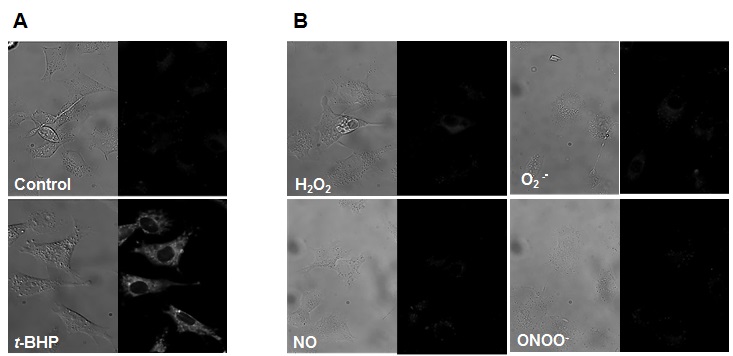
A: MitoPeDPP stained cells with t-BHP treatment (t-BHP) and without (control).
B: MitoPeDPP stained cells with ROS or RNS exposure.
*As ROS generators, PMA (O2–・), NOC7 (NO), and SIN-1 (ONOO–) were used in the experiments.
*Abbreviations
t-BHP: tert-butylhydroperoxide
PMA: Phorbol Myristate Acetate
NOC7: 1-Hydroxy-2-oxo-3-(N-methyl-3-aminopropyl)-3-methyl-1-triazine
SIN-1: 3-(Morpholinyl)sydnonimine, hydrochloride
References
1) K. Shioji K, Y. Oyama, K. Okuma and H. Nakagawa, "Synthesis and properties of fluorescence probe for detection of peroxides in mitochondria.", Bioorg Med Chem Lett., 2010, 20, (13), 3911.
2) S. Oka, J. Leon, K. Sakumi, T. Ide, D. Kang, F. M. LaFerla and Y. Nakabeppu, "Human mitochondrial transcriptional factor A breaks the mitochondria-mediated vicious cycle in Alzheimer’s disease", Scientific Reports ., 2016, DOI: 10.1038/srep37889 , .
3) S. Nakamura, A. Nakanishi, M. Takazawa, S. Okihiro, S. Urano and K. Fukui, "Ionomycin-induced calcium influx induces neurite degeneration in mouse neuroblastoma cells: Analysis of a time-lapse live cell imaging system", Free Radical Research., 2016, 50, (11), 1214.
4) M. Akimoto, R. Maruyama, Y. Kawabata, Y. Tajima and K. Takenaga, "Antidiabetic adiponectin receptor agonist AdipoRon suppresses tumour growth of pancreatic cancer by inducing RIPK1/ERKdependent necroptosis", Cell Death Dis., 2018, 9, 804.
5) M. Álvarez-Córdoba, A. Fernández Khoury, M. Villanueva-Paz, C. Gómez-Navarro, I. Villalón-García, J. M. Suárez-Rivero, S. Povea-Cabello, M. Mata, D. Cotán, M. Talaverón-Rey, A. J. Pérez-Pulido, J. J. Salas, E. M. Pérez-Villegas, A. Díaz-Quintana, J. A. Armengol, J. A. Sánchez-Alcázar , "Pantothenate Rescues Iron Accumulation in Pantothenate Kinase-Associated Neurodegeneration Depending on the Type of Mutation.", Mol. Neurobiol. ., 2019, 56, (5), 3638.
Handling and storage condition
| Appearance: | Yellow to yellowish orange crystalline powder or solid |
|---|---|
| Purity (HPLC): | ≧ 80.0 % |
| NMR spectrum: | Authentic |
| 0-5°C, Protect from light, Nitrogen substitution |









